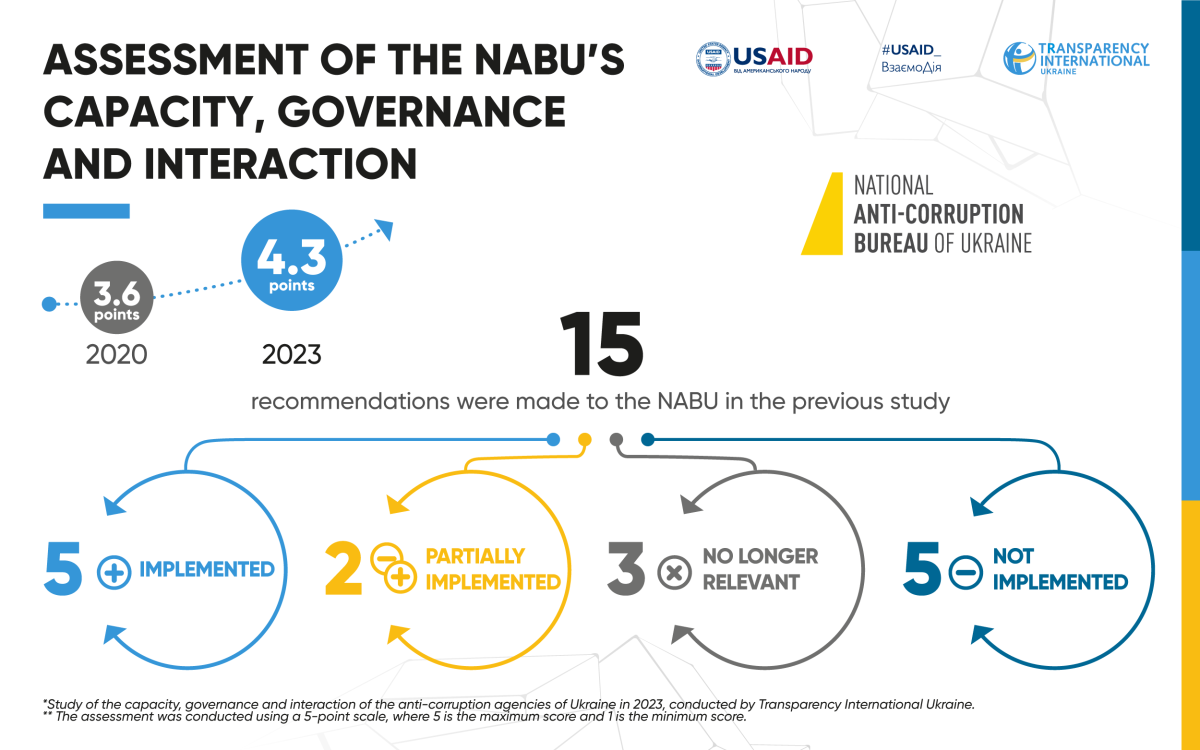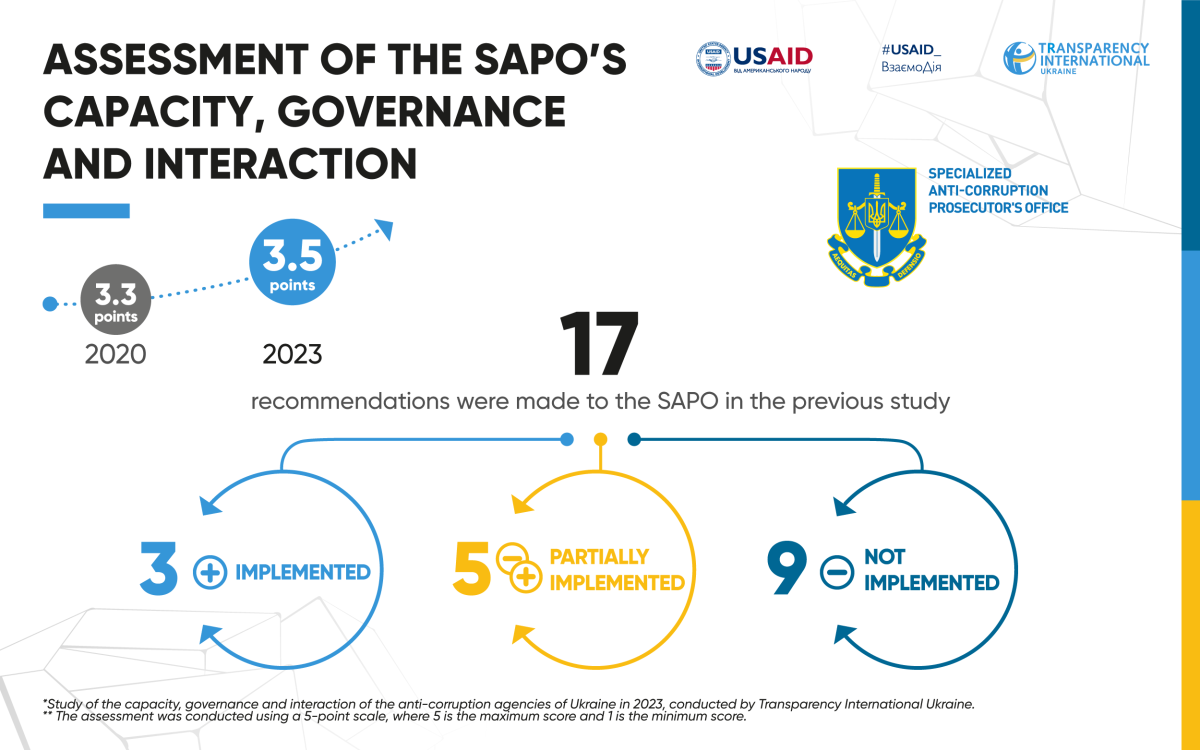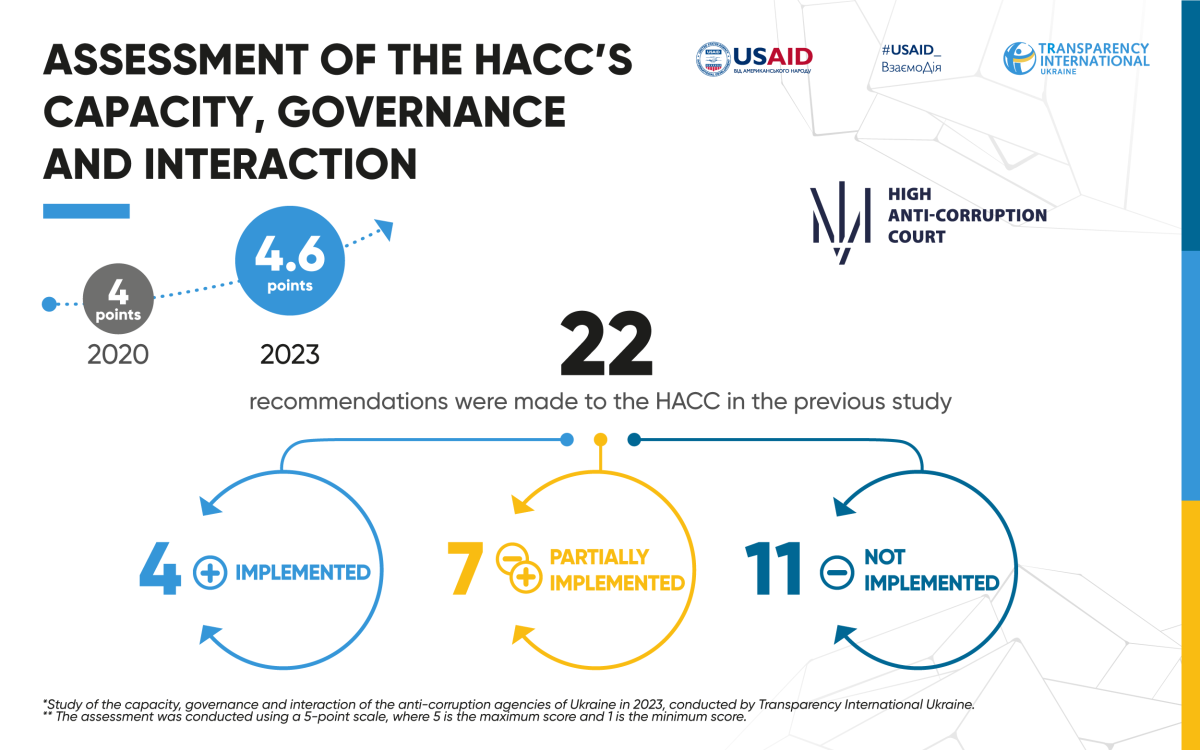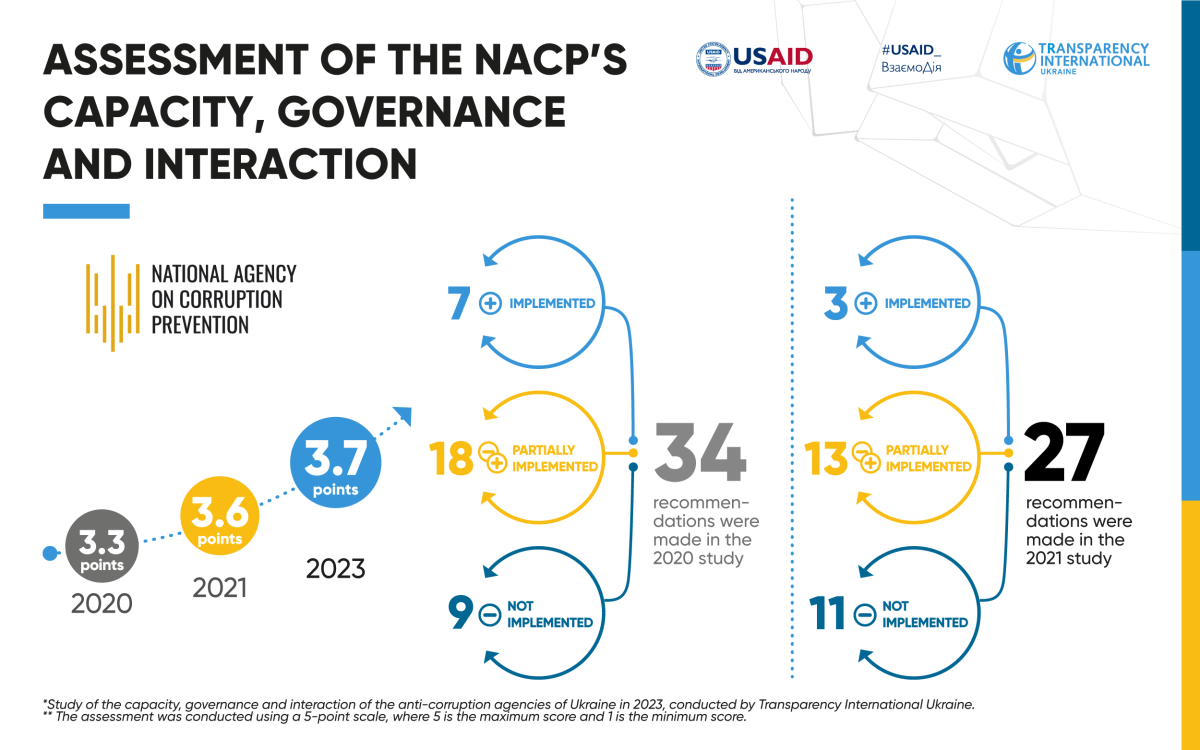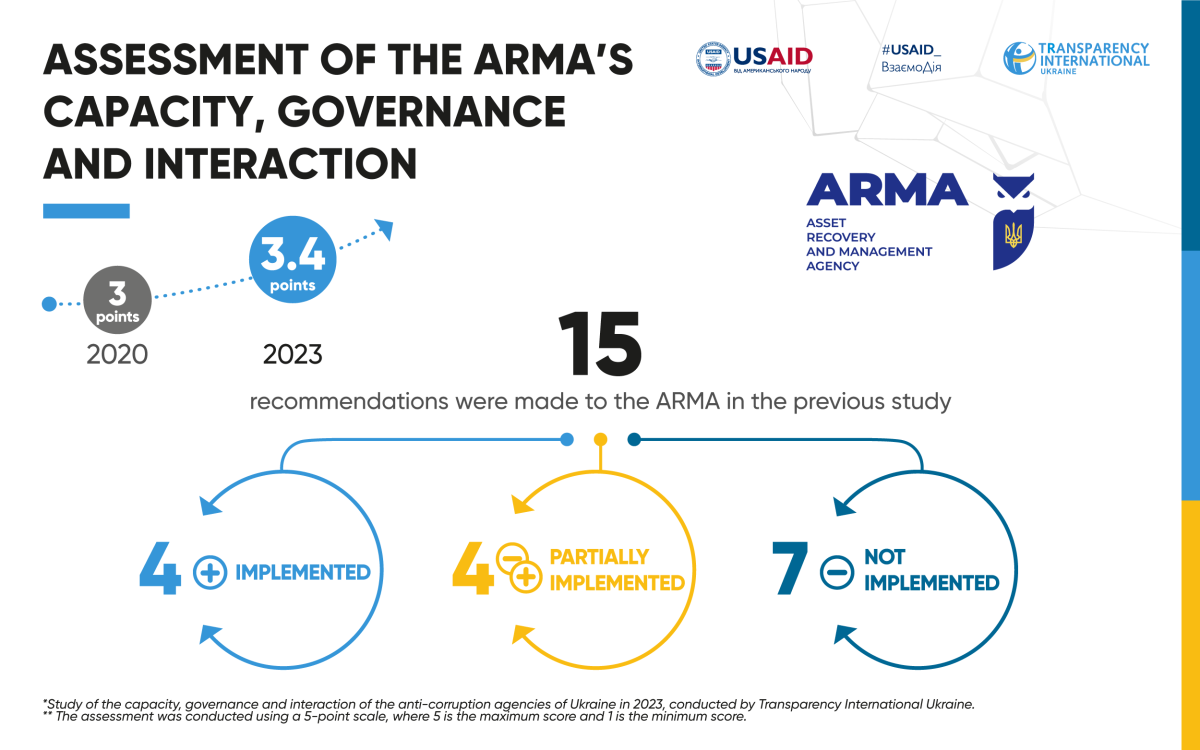

When the media or politicians talked about fighting corruption in recent months, it was mostly about corruption investigations or court cases. This is not surprising: in the midst of the war, the demand of Ukrainians for fair punishment has increased significantly, both when it comes to traitors or spotters, and when it comes to bribes.
However, the issue of anti-corruption is much broader and covers many more things that can ensure real achievements in such a struggle. It is not only about the results but also the capabilities to achieve them because without capacity, there can be no question of efficiency.
To understand the capabilities of the anti-corruption ecosystem, Transparency International Ukraine conducted the second study of the management and interaction of anti-corruption infrastructure bodies, covering almost three years of their activities (2021–2023). So, to what extent do the capabilities of the anti-corruption ecosystem coincide with the results?
Let us try to figure it out.
As we have already mentioned, people mostly notice the effectiveness of the fight against corruption when there is information about suspicion notices and verdicts, that is, the area covered by the NABU-SAPO-HACC connection. It is important to understand that the capacity of one of these bodies directly affects the capabilities of the others. Thus, mistakes or obstacles at the investigation or trial stages result in fewer high-quality rulings in corruption cases.
The issue of anti-corruption is much broader and covers many more things that can ensure real achievements in such a struggle. It is not only about the results but also the capabilities to achieve them because without capacity, there can be no question of efficiency
NABU’s high stakes
The National Anti-Corruption Bureau of Ukraine (NABU) is undoubtedly the most famous anti-corruption body in our country. It was the Bureau that showed the greatest growth in our assessment: compared to 2020, the body’s capacity indicators increased from 3.6 to 4.3 points out of a possible five. This is quite a high score.
First of all, this score is the result of the lack of noticeable management problems. Even despite the outbreak of the full-scale war and the suspension of the commission’s work for more than six months, the competition to select a new NABU director did take place. It lasted less than a year, which is a long time, but compared to the competition of the Specialized Anti-Corruption Prosecutor’s Office (SAPO), it showed remarkable progress. Therefore, after the appointment of Semen Kryvonos as the head of the Bureau in March 2023, the NABU and the SAPO enhanced their cooperation and significantly intensified the investigation of corruption cases at the highest level. A number of experts objectively note that we will see the real results of the new director’s work at least a year after the appointment because all the achievements of spring 2023, including the high-profile case of Kniaziev, the Head of the Supreme Court, are the work of detectives and the former leadership of the Bureau. But they, indeed, were not neutralized by the new one.
This was achieved, among other things, by improving the legislation on the activities of the NABU, in particular, by eliminating the contradiction between the Constitution and the Law On the National Anti-Corruption Bureau of Ukraine and determining that the NABU is a central executive body with a special status. The procedure for auditing the effectiveness of the National Bureau was clarified. Amendments were also introduced that clearly defined the powers of the Cabinet of Ministers to appoint and dismiss the Director of the National Anti-Corruption Bureau. Although, again, in the process of competitive selection, a number of issues arose, as a result of which the favorites of the public — professionals from the NABU itself — got eliminated. But one way or another, the very procedure of the competition can be considered successful.
Currently, we are witnessing a significant movement in the investigation of high-profile corruption cases of the NABU and the SAPO. But such a movement also has its price, including in terms of the number of employees involved in such processes. To cope with the load on the bodies of the anti-corruption ecosystem, it is necessary to proportionally increase the number of NABU employees, SAPO prosecutors, judges of the High Anti-Corruption Court (HACC) and court staff. Because the effectiveness of the work of the entire NABU-SAPO-HACC chain depends on the capacity of each of these institutions.
Moreover, in its report on Ukraine as a candidate country, the European Commission separately pointed out the need to increase the number of NABU employees, in particular, additional staff to work on investigations — detectives, analysts, and technicians.
Currently, according to the specialized law, the total number of employees of the central and territorial departments of the NABU should not exceed 700 people. Two draft laws on increasing the number of employees of the Bureau have already been registered in the Parliament; both propose to bring it to 1,000 people, which will enhance the function of pre-trial investigation. However, today, in the first reading, the Rada voted on draft law No. 10203-1, according to which the staff of the NABU should increase from 700 to 1,000 employees in three stages: 100 vacancies will be filled each year: 2024, 2025, and 2026. This is a good decision because it is quite a big challenge to recruit as many as 300 qualified specialists per year, and then integrate new personnel into the work of the Bureau. To see the full picture, it is necessary to have the full text of the voted draft law; currently it has not been published.
Another important and, sadly, long-standing problem is ensuring the right of the NABU to autonomous wiretapping. The necessary legislation was adopted in autumn 2019, but the provisions spelled out in it have not yet been implemented in practice. Currently, the Security Service of Ukraine has the necessary equipment, and the NABU can receive it upon request. But since the Bureau is a separate state body that must carry out its work independently and impartially, it needs its own tools to ensure such functions.
The creation of an independent body that will be responsible for conducting expert examinations in high-level corruption cases is no less important for effective anti-corruption investigations. This could have a positive impact on the speed and quality of NABU investigations, ensuring that examinations are carried out effectively, independently, on time and, most importantly, without pressure. Nowadays, employees of the Bureau cannot quickly conduct an examination because there is a queue of cases, and this significantly delays the investigation.
The notorious “Lozovyi Amendments” cause significant obstacles. The consequences of their application can already be seen in the decisions to close criminal proceedings in a number of cases due to, according to the judges, the wrong entity that is to extend the pre-trial investigation.
Among the high-profile cases that were closed due to the “Lozovyi Amendments” are the cases of Ukrzaliznytsia, the Dubnevych brothers, Oschadbank, the first episode of the Rotterdam+ case, and the Alperin case.
Therefore, to correct this shortcoming, the parliament needs to improve the substantive and procedural criminal legislation.
On the positive side, the NABU is a stable, effective, and independent institution that demonstrates growth and regular implementation of best practices in work, which influences the results of the entire anti-corruption system. This might have been impossible without its effective interaction with the SAPO.
The NABU is a stable, effective, and independent institution that demonstrates growth and regular implementation of best practices in work, which influences the results of the entire anti-corruption system.
SAPO with the prospect of independence
As a result of our study, the Specialized Anti-Corruption Prosecutor’s Office only scored 3.5 points out of five, and not without reason.
Since August 2020, the SAPO did not have a full-fledged head for almost two years. The situation at that time was absurd: as of June 2022, the winner of the relevant competition had been known for half a year, but not appointed by the commission.
Although SAPO prosecutors have additional institutional guarantees of independence from interference in their work compared to other units of the prosecutor’s office, an issue remains. In the absence of a full-fledged head, the Prosecutor General (at that time Iryna Venediktova) was to approve all the actions of the acting head, and this could and did allow for interference in the course of anti-corruption investigations. This is how the case against Oleh Tatarov was “buried.” This indicates a decrease in the ability of the SAPO to perform the functions assigned to it.
Although in June 2022, Oleksandr Klymenko did head the Specialized Anti-Corruption Prosecutor’s Office, a number of problems of the department persisted, in particular, the lack of real independence and the body’s own legal entity.
Because of this, the agency still does not have its own administrative office and secret-regime unit. That is, it is currently impossible to write directly to the SAPO; all correspondence passes through the Prosecutor General’s Office, which creates a danger of leakage of sensitive data. This also increases the risk of a human error when some letter simply might not reach the addressee. Due to the lack of its own legal entity, the SAPO does not have its own website to disseminate information and is unable to develop and implement a communications strategy.
Some restrictions also apply to the capabilities of the SAPO Head; this affects the body’s work and may give the impression that the activities of the Anti-Corruption Prosecutor’s Office are not effective enough.
For example, currently, Oleksandr Klymenko cannot independently send requests for extradition of persons, and in the NABU-SAPO cases, many of the defendants are hiding abroad. Such requests can be sent only through the Prosecutor General, and this affects the reputation of the Specialized Anti-Corruption Prosecutor’s Office. The SAPO Head cannot independently register the proceedings against an MP in the Unified Register of Pre-Trial Investigations.
Interestingly, the specialized legislation on the SAPO, unlike with the other bodies of the anti-corruption ecosystem, has remained almost unchanged for eight years and has somewhat lost the ability to adequately address the challenges the institution faces in its activities.
The problems we have mentioned were also voiced by the European Commission. In its report, the Commission indicated the need for the SAPO to have additional protection against possible unlawful interference. This risk can be eliminated, in particular, by improving the procedures for selecting the SAPO Head and the body’s key officials, increasing its organizational and procedural autonomy, and improving the accountability system.
It should be noted that today, on November 21, the Parliament supported draft law No. 10060 On Amendments to the Criminal Procedural Code of Ukraine and Other Legislative Acts of Ukraine to Enhance the Independence of the Specialized Anti-Corruption Prosecutor’s Office in the first reading. This draft law should provide for the creation of a separate legal entity of the SAPO, improve the competition for the post of head of the prosecutor’s office, and also ensure the creation of a separate disciplinary commission for the SAPO and an external independent audit of the body. Although the draft law contains a number of shortcomings, such as the lack of powers of the SAPO head to initiate criminal proceedings against MPs and independently direct extradition requests, in general, it lays the foundation for the independence of the SAPO and meets the requirements of the European Commission on this issue. This draft law also needs more in-depth analysis when the full text of the document is published.
Another issue is the lack of an external audit of the SAPO’s performance, which, for example, is provided for the NACP and the NABU. That is why TI Ukraine emphasized the need to introduce such a form of assessment to understand the strengths, weaknesses, and areas of growth of the body.
We can already state the formation of quite a high-quality interaction between the NABU and the SAPO. Interestingly, the results of this interaction may give Ukrainians the impression that the level of corruption in the country has increased significantly compared to previous years. This is because since last autumn, we have witnessed a much higher number of suspicion notices for corruption, and, accordingly, a much higher number of news headlines covering this, which may create a somewhat false impression of the increase in corruption rather than investigations into it.
For the headlines to make a more pleasant impression, we need verdicts, and this is already the task of the High Anti-Corruption Court.
We can already state the formation of quite a high-quality interaction between the NABU and the SAPO. Interestingly, the results of this interaction may give Ukrainians the impression that the level of corruption in the country has increased significantly compared to previous years.
The HACC is at the peak of trust, but there are certain issues
The High Anti-Corruption Court received the highest score in our study — 4.6 points out of five possible. There are several reasons for such an achievement.
First of all, the HACC is the newest institution in the criminal justice system, so, in our first study, its scores were the highest. However, one thing is to get a high rating in the short time of the operation, and another one is to maintain such a reputation and even improve it. The Anti-Corruption Court managed to do it.
The HACC and stakeholders cope successfully with most of the challenges the institution faces. Judges and court staff adhere to the legislation on the prevention of corruption, regularly communicate about the results of hearing cases, and in general, when it comes to this court, there is an impression of a truly politically impartial and independent institution. There were issues in the work of the institution when it came to problems with the classification of individual verdicts, as well as with funding. But currently, they do not have a critical impact on the overall trust in the Court.
In our study, we did not assess the effectiveness of implementing the substantive and procedural criminal legislation based on which the HACC operates. But the problems inherent in all courts regarding the inconsistent practice of applying certain provisions of the law, as well as the duration of court proceedings in individual cases, also apply to the High Anti-Corruption Court.
Another issue is the load on HACC judges. Although there are fewer cases under its consideration, the number of judges is also small, and all cases are heard collegially; that is, three judges participate in court hearings. That is why the European Commission pointed out in its report the need to increase the number of HACC judges to cope with the workload, which will only grow, as we did before.
Another issue is the lack of premises for the HACC Appeals Chamber, considering the increase in staff, as well as adequate funding for the current needs of the court, competitive salaries, and judicial remuneration.
However, literally before the publication of the study in the media, separate complaints appeared regarding the decisions of some HACC judges and the practice of classifying rulings, which has become more frequent. Among the most notorious cases, where the HACC classified the decision, we can name the verdicts against the ex-minister of ecology Zlochevskyi in the case of a super bribe, the ex-chair of the Accounting Chamber Patskan, lawyer Horetskyi in the case of a bribe to Kniaziev. These are somewhat negative signals that should be considered.
The HACC is the newest institution in the criminal justice system, so, in our first study, its scores were the highest. However, one thing is to get a high rating in the short time of the operation, and another one is to maintain such a reputation and even improve it. The Anti-Corruption Court managed to do it.
Lessons the NACP did not learn
The National Agency for Corruption Prevention, which should form the anti-corruption policy in Ukraine as a whole, faced the most large-scale task among all bodies of the anti-corruption ecosystem. Unfortunately, over the past three years, different things have happened in this sphere.
We rated the NACP’s capacity at 3.7 points out of five. This is even though the Agency is the only body that we assessed not twice, but three times. In general, a lot of things can be covered in terms of the capacity of the NACP because it is the only anti-corruption body that has undergone an external independent audit.
Established in 2015, the NACP began operating in 2016. The body used to have collegial leadership; however, due to corruption scandals and a lack of efficiency in 2020, the Agency was rebooted and headed by Oleksandr Novikov. After the reboot, the NACP had to build its work almost from scratch.
In addition, the body has repeatedly faced attempts to undermine its institutional capacity. The NACP is the body of the anti-corruption ecosystem that has suffered the most over the past three years after the reboot, in particular in terms of the destruction of its mandate and the inhibition of processes by external players.
The most scandalous attempt was the decision of the Constitutional Court of October 27, 2020, which effectively abolished almost all the powers of the NACP. Fortunately, the Verkhovna Rada restored its functions within two months, and since then, the institution has not undergone such comprehensive influences.
A similar challenge for the National Agency was the restrictions that were introduced with the outbreak of the war. MPs banned the NACP from verifying the declarations of officials and conducting special checks, and they also turned the obligation to declare into a voluntary action. Just as with the onset of the COVID-19 pandemic, the obligation of political parties to submit their financial reports to the Agency for verification was suspended. In fact, among all the anti-corruption agencies, “wartime” restrictions affected the NACP the most.
In addition, the parliament and the government delayed the process of adopting the State Anti-Corruption Strategy and Program in 2020–2023, which are important for our country. Thus, MPs adopted the anti-corruption strategy in a weakened version, 4.5 years after the expiration of the previous one. The State Anti-Corruption Program was approved with a delay of two months after the legislative deadline, at the urging of the public and the NACP itself.
We should mention the diligent work of the Agency on the development of the State Anti-Corruption Strategy and Anti-Corruption Program. The NACP engaged all stakeholders, including the public, in the development and wide discussion of these documents, and such an open process undoubtedly had a positive impact on the final result.
We can admit that the reboot of the NACP did take place. We no longer witness new corruption scandals in the Agency and see tangible progress in the development of the national anti-corruption policy; the previous collegial NACP failed to develop a new anti-corruption strategy in 2018–2019.
However, unfortunately, the current NACP does not always use the principle of transparency, which has been mentioned by domestic and international experts for many years. Moreover, this was one of the main comments regarding the Agency’s activities in the report on the results of its first independent audit.
In particular, the auditors pointed out that, contrary to the provisions of the Law of Ukraine On Access to Public Information, the NACP did not publish in full its own regulatory acts, acts of individual action, and draft decisions subject to discussion. The rules of logical and arithmetic control of e-declarations (despite numerous calls from the public for their publication and improvement) and a number of other documents, such as the rules for verifying the declarations of individual employees of the SSU, NABU, etc., were not published. It should be noted that the European Commission in its report also stressed that shortcomings in the rules for automated control of e-declarations still exist and that the NACP should consider them in the medium term. International partners expect this from us.
No less problematic is the regulation and application of lifestyle monitoring of declarants by the NACP. The public has been criticizing this tool for several years. Thus, back in 2021, TI Ukraine published a study with recommendations on how to eliminate the shortcomings of lifestyle monitoring.
The discussion about the independence of the NACP was triggered by the story of the anti-corruption examination that the Agency had conducted regarding the scandalous draft law No. 5655 on urban planning.
The UNIAN publication quotes Oleksandr Novikov, who favorably commented on the adoption of the draft law: “In 2021, we conducted an anti-corruption examination of it, pointed out a large number of corruption risks, and gave recommendations for their elimination. By the second reading, all the risks we covered in the anti-corruption examination in 2021 had been eliminated.” However, experts emphasized that not all the comments of the NACP regarding this draft law had been eliminated before its adoption. Therefore, it is not clear what motivated the head of the NACP to approve the adopted draft law.
Therefore, we can conclude that our recommendations regarding the independence of the NACP were only partially fulfilled; moreover, new concerns appeared in this regard, in particular, after the anti-corruption examination of draft law No. 5655.
Unfortunately, there are large gaps in terms of anti-corruption examination of draft laws by the NACP. This is a global direction that lays the foundation for the entire state management system.
It should be mentioned that, including due to shortcomings in the Agency’s approaches to the exercise of its mandate, external auditors in 2023 could not recognize the work of the NACP as effective, but they “did not recognize it as ineffective.” Although the results of the audit of the National Agency did not become the basis for changing its management, the auditors did not recognize that the criterion concerning Oleksandr Novikov was met. Interestingly, the head of the NACP himself, commenting on the results of the audit, thanked the Commission for “those of the recommendations that will help us strengthen our role in preventing and combating our greatest internal enemy — corruption.” That is, he actually pointed out that he would pay attention to only part of the auditors’ comments, and not to all of them.
Therefore, the assessment of the work of the National Agency on Corruption Prevention shows that most of the problems described by the public and international experts that do not allow it to reach another level of capacity and efficiency are consistent management policies and approaches. This is the case when the solution of problems primarily depends on the initiative from within the institution.
It also depends on the adequate reaction of the civil sector and experts to the publication of the NACP international audit report. In fact, we were given a real tool to measure the effectiveness of the key anti-corruption body, for which we fought. However, when the results were published, the public was mostly silent. This is a disadvantage because, whoever heads the NACP in the future, may not get the right signal.
The competition for the new NACP head began on November 10, and the term of office of Oleksandr Novikov expires in mid-January 2024. One can only hope that the newly elected leader will finally break the “vicious circle” and be able to correct the already well-known shortcomings of the NACP.
The NACP is the body of the anti-corruption ecosystem that has suffered the most over the past three years after the reboot, in particular in terms of the destruction of its mandate and the inhibition of processes by external players.
Ineffective ARMA
The fifth element of the anti-corruption ecosystem is the ARMA. This is probably the least popular body, but certainly not the least important.
The Asset Recovery and Management Agency scored 3.4 out of a possible five in our study. This is the worst indicator among other bodies of the anti-corruption ecosystem. Why did this happen?
The ARMA was established in 2016 to search for “criminal” assets and recover them into the national income, and the Agency also manages seized property. The creation of the ARMA is one of the conditions for visa-free travel, so a lot of attention has been paid to its work for years.
And for good reason. The Agency is constantly criticized by both state and foreign actors, and the public; the European Commission mentioned the Agency eight times in its report.
There are several reasons for that. The first and perhaps the most noticeable is this one: at present, even despite the seven-year existence of the ARMA, the legislative framework of activities and the practice of its implementation remain far from perfect. No matter how much the public, including TI Ukraine, has called on the parliament, some urgently needed changes have not yet been adopted.
The Agency also lacks an independent and professional head who will be able to overcome the “legacy” of previous managers and establish productive communication with stakeholders. Throughout the period of our study, the ARMA remained without a full-fledged head and, accordingly, was dependent on how the Presidential Office was satisfied with the work of the head of the Agency.
Unfortunately, even after the appointment of Olena Duma as the head of the ARMA, some of these problems remain relevant. Actually, the European Commission also mentioned public concerns about the selection and appointment process in the report, as well as the integrity of the new ARMA head. In a little more than four months of work, Olena Duma has already become the subject of journalistic publications, and they mentioned the controversial personnel policy of the new head.
That is why we remind of the need for the parliament to adopt amendments to the specialized law on the ARMA, and for the Cabinet of Ministers to adopt by-laws that will guide the Agency in its activities. As of now, certain by-laws have already been adopted, in particular, on the sale of seized property, as well as on the procedure for selecting asset managers.
Little progress has been made in improving the work of the ARMA over the past three years. Of course, many of these achievements were invisible given the Agency’s heavy load of assets with a Russian or Belarusian trace, which arose after the beginning of the full-scale invasion and deepened the existing problems and highlighted new ones in the operation of the body. Despite the urgent request to search for and confiscate such criminal assets, we currently have practically no examples of successful recovery of this property to Ukraine. The European Commission also noted that the tools for confiscation and recovery of assets are not used enough in Ukraine, and therefore the relevant experience still needs to be gained.
All this requires a comprehensive approach to assessing the work of the ARMA as well as improving legislative support and the practice of the body. Moreover, the approach to reforming the Agency should be balanced, without sharp ideas and half-measures. Haste and unjustified steps might result in appeals to the European Court of Human Rights and considerable reparations to the owners of the seized assets.
The approach to reforming the Agency should be balanced, without sharp ideas and half-measures. Haste and unjustified steps might result in appeals to the European Court of Human Rights and considerable reparations to the owners of the seized assets.
When will capacity turn into efficiency?
Being in good shape will not make a gymnast an Olympic champion, and the diploma of an engineer is not a prerequisite for great discoveries. But they provide an opportunity and a foundation. Similarly, anti-corruption bodies need opportunities to implement the functions assigned to them.
After the NABU, SAPO, ARMA, NACP, and HACC were launched, the society expected their maximum engagement. However, the creation of anti-corruption bodies alone, even when developing seemingly clear legislation for their work, does not guarantee that these institutions will immediately work successfully. In addition, we have already seen that in the process of their work, there are almost always lessons to be learned and, accordingly, ways to improve the legal framework of activities.
Since these bodies were created and launched at different times, even in different political and social circumstances, their synchronization with each other and with other important departments was delayed, slowed down, and not always smooth. Such a system can only work in full cooperation and with absolute independence from the government to monitor, check, and, if necessary, punish its representatives. To do this, it undoubtedly also needs personnel who are competent and free from any political influences, as well as legal guarantees of such independence.
Because regardless of what top-level institutions we build and regardless of what independence and powers we endow them with, the key will be the ethical and moral component of the personnel who head anti-corruption bodies and send appropriate signals not only to their teams, but to the whole country. Ukraine is going through the stage of forming the anti-corruption structure, where all its institutions are checked for strength in terms of their personnel. This has already been confirmed by the case of the SAPO, where the first leader who left a “trace” was Nazar Kholodnytskyi, as well as the NACP, which failed in its collegial format under the leadership of Natalia Korchak. Unfortunately, the results of the NACP audit, headed by Oleksandr Novikov, were also alarming. The current heads of the SAPO and NABU are passing their tests for professionalism and independence. The HACC is looking for an optimal leadership format. The human resources that fill the institutions are the basis for the direction in which they will develop.
However, over the years, all five bodies of the anti-corruption ecosystem have had to overcome challenges in one way or another. Some of them, like a certain confrontation between the NABU and the SAPO in 2017–2018, have so far been overcome. Others, such as the partial reluctance of the NACP to heed the recommendations of partners, are still relevant. But if we assess the opportunities for anti-corruption activities, the changes are already noticeable.
It is not yet clear how quickly we will see an indisputable result. Unfortunately, it is the war that can become the catalyst that will show how much the capacity of the bodies corresponds to their willingness to achieve results. We believe it to be possible because we are already witnessing the results of the work of the anti-corruption ecosystem. But such results, of course, should be enhanced so that, following the example of the anti-corruption ecosystem, we could reform the entire law enforcement system of Ukraine.
This publication was made possible by the support of the American people through the United States Agency for International Development (USAID) within the SACCI project. The content of this publication is the sole responsibility of Transparency International Ukraine and does not necessarily reflect the views of USAID or the United States Government.




